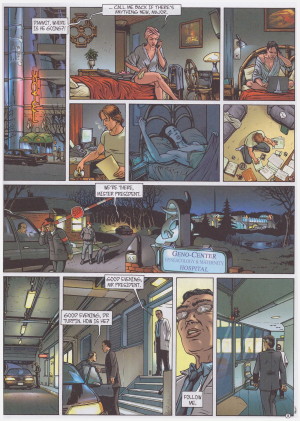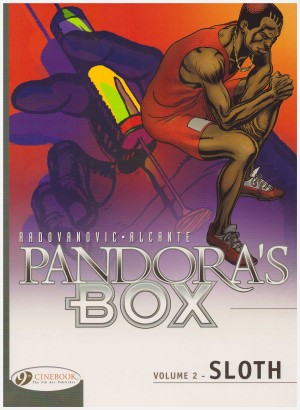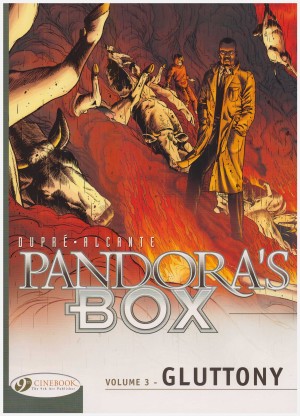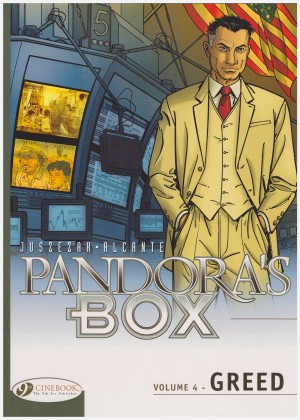Review by Karl Verhoven
It’s an arresting cover image that opens this European thriller series, that of a baby with severe injuries, yet it’s simultaneously comforting by virtue of also clarifying that hospital care is occurring.
In mythology Pandora’s Box was a repository for the evils of the world, here reinterpreted as the seven deadly sins, and when she opened it the sins were unleashed. As do so many European creators, writer Didier Swysen uses a single name alias, Alcante, and was talented enough to win an open competition for new writers held by Spirou in 1995. Nevertheless, it was a further seven years before he sold scripts regularly, and a decade before he began Pandora’s Box.
The series allies the old sins with current technology, and from the beginning the different types of stories this concept prompted were scheduled to switch artists with every new sin. Unusually, therefore, for French albums, an entire series of eight books saw publication in a little over two years from 2004. It’s also noteworthy that this is yet another European thriller set in the USA. Just what is it about the culture that holds such an appeal?
A week before polling day a presidential election is too close to call. The incumbent Narcissus Shimmer seems a decent man, one who’ll not stoop to personal attacks for votes, and one who employs former convicts as a point of principle, leading by example. Yet Shimmer also has his secrets, and areas of neglect, such as a son in his twenties living in France. Faced with losing, the opposition engage the services of investigator Ron Grubb to locate some dirt on Shimmer. “We’re so close in the polls that a last minute scandal couldn’t fail to give me victory”, explains the challenger.
Alcante’s character names are deliberately evocative, in keeping with the mythological themes suggested by his series title, his plot keeps us guessing and he throws in a couple of surprising characters. As we’re dealing with the seven deadly sins it’s only logical that ethical conundrums are eventually revealed to be at the heart of the story, and so is the baby on the cover.
Didier Pagot is another in what’s seemingly an assembly line of Franco-Belgian artists who’s supremely confident at depicting humans in their natural surroundings, and never stints on detail. He hasn’t quite yet attained the full mastery of, say, Philippe Francq, but he’s well on the way, and he returns for the series’ final volume, Hope.
Despite Pride being somewhat tenuous as a title, this motors along very well in the smooth manner of a Jean Van Hamme thriller. Yet the translation hits a few speedbumps. Even allowing for a difficult task considering the specialist complexity of the language used, there’s an occasional stiffness and formality to the dialogue that doesn’t ring always ring true. This is just teething problems, though, as it doesn’t affect the remainder of the series, which continues with Sloth.
It’s also worth noting that although the books are numbered, they can be read in any order.





